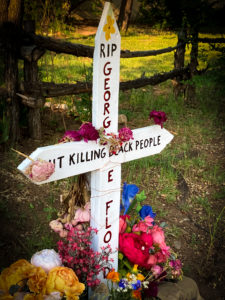
Santa Fe, NM: A roadside memorial to George Floyd Memorial near downtown Santa Fe.
On April 20 as the afternoon grew later, the world awaited one of the most anticipated verdicts in a generation. The case was the State of Minnesota v. Derek Chauvin, but it seemed as though once again the value of Black Life was on trial in the United States of America. Chauvin was accused and found guilty on all accounts for the murder of George Floyd, but the nation and the world knew more was at stake in the verdict. When George Floyd was killed in May 2020, it was a moment where the specter of racism and police violence were thrust again into the national consciousness from their home in the daily lives of black people. The murder was particularly cruel and horrific. For nine minutes and twenty-nine seconds the former police officer Derek Chauvin kneeled on the neck and back of George Floyd, suffocating him to death as he cried out for help, for his mother, and for God.
The incident was caught on video by a teenager who shared it to social media. Multiple news outlets picked it up and it’s playing sparked national outrage that ignited protests in large cities and small towns across America. While the world was on pause in the midst of the pandemic, millions got to see with their own eyes what many black families fear: a public death at the hands of a law enforcement officer, and another black man passing from life to become a hashtag.
As the verdict was read, guilty on all counts, a mix of emotions could be seen and heard throughout the nation. Relief, sadness, hope, anger, fatigue, closure. At the same time there was an acknowledgment that this was not the end of the struggle for equal justice under the law for black people, but another point in the middle. For many believers it was on occasion for lamentation more than celebration for a number of reasons. People breathed a sigh of relief for accountability by a law enforcement officer, but many noted that this guilty verdict could not bring restoration of George Floyd’s life. There is still much violence in the land and great need for God’s intervention. There is a lot of change to be had, a lot of work to be done and thousands of other stories that did not end the way George Floyd’s did. Within the same week, in the same state there was yet another case of an unarmed black man who lost his life too soon in an encounter with the police. In this nation there are people who lose their lives every day to violence. It is the reason many law enforcement officers go to work everyday, to protect and serve and prevent people from losing their lives. And yet the shadow of death by violence looms large in our communities. This enduring reality causes many of us to still cry out to God for justice, mercy, and change.
Lamentations is a book of the Bible that doesn’t get read very often, but is filled with violent and difficult imagery. The author wrote it during a time of great trauma when the children of Israel were in exile in Babylon and still facing destruction, disease, and death in the once great city of Jerusalem. They were aware that it was sin that brought the terrible conditions of suffering and injustice they experienced, but they were also aware that their hope was in God’s intervention. Our world in the wake of violence is similar to theirs in many ways, different than theirs in many others, but our hope remains the same in God’s intervention. The writer confesses his faith in the Lord and urges others to remember this time of trouble. This seems like a strange thing to do, remember a time of trouble, but it is instructive for us today.
Lamentations 3:20-23(NLT) says:
20 I will never forget this awful time,
as I grieve over my loss.
21 Yet I still dare to hope
when I remember this:
22 The faithful love of the Lord never ends!
His mercies never cease.
23 Great is his faithfulness;
his mercies begin afresh each morning.
It is tempting to forget pain, trauma, and the difficulty of a struggle; especially when we receive some relief. It is tempting to move on from the case of George Floyd because the verdict has been rendered, but the lessons must be enduring if we are to love in a world that keeps more people like George Floyd alive instead of relieved at their murderer being punished. This is one reason Lamentations may be in the Bible, to give hope to everyone going through a time of individual and societal struggle. It speaks to the presence of pain, but also the endurance of God’s presence in ways that encourage our souls to overcome weariness.
Believers are invited by Lamentations to hear and remember the pain we experience, as well as the pain of others. But also to bear witness to the hope of God in the midst of it. Great is God’s faithfulness, His love never ends. Let us be lovers of ourselves, our neighbors, and our communities as we continue to cry out and advocate for God’s justice in the midst of the weariness and violence that continues to plague our land.

Amen #DefundThePolice
Amen. Thank you for sharing this reminder to not forget the pit and to hope in God.
Praise God! Remind us of your glory, even in the midst of tragedy. Great read brother❤️